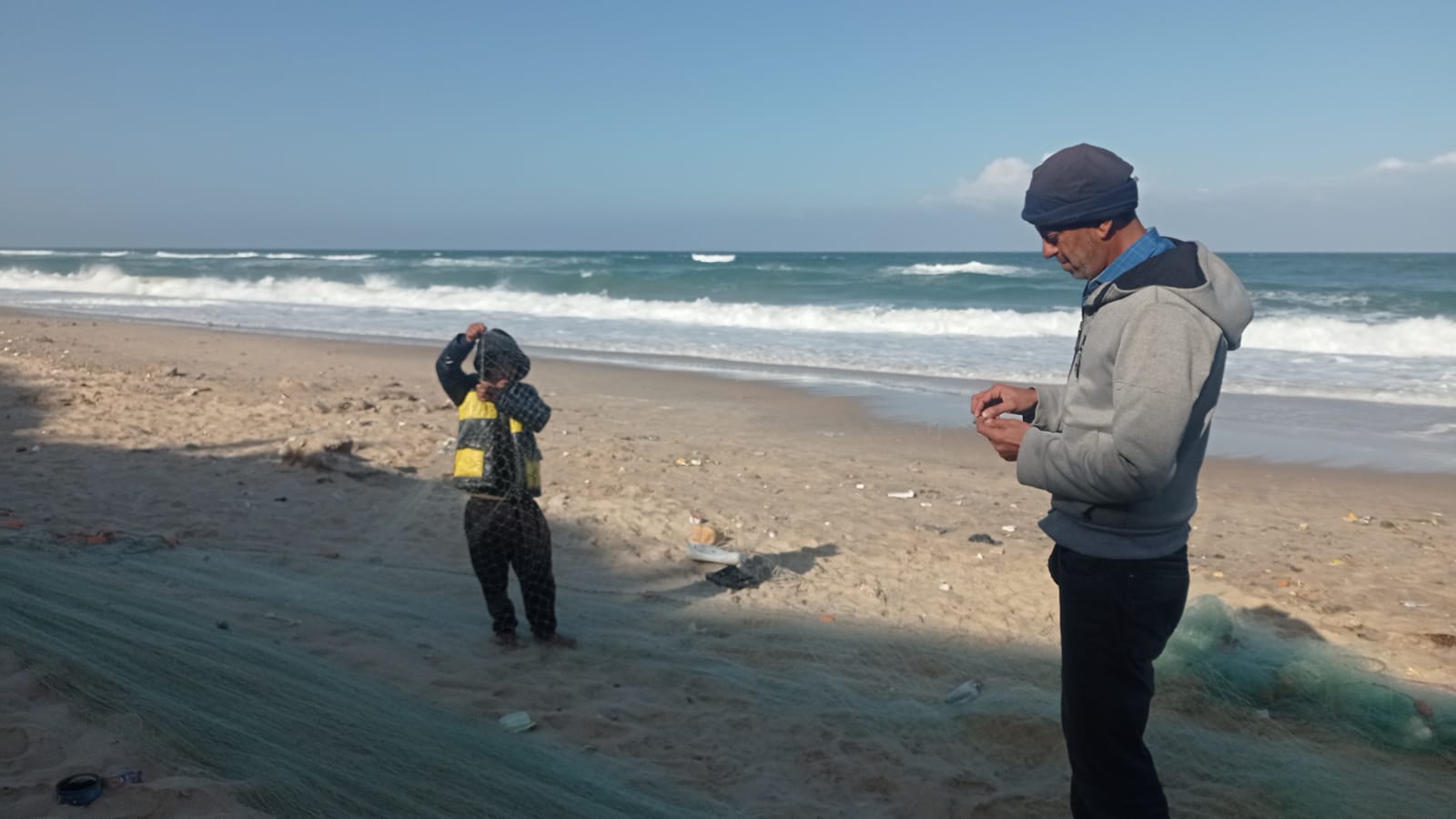
Every fishing trip is a brush with death for these men.
War on Gaza: Palestinian Fishermen Are
Risking Their Lives to Feed Starving Gaza
Abubaker Abed / Miiddle East Eye
(March 5, 2024) — Every morning, at daybreak, Mahmoud Hamada pushed his boat out to sea knowing he may never return.
“You can fish during the early hours, but you know for sure that you’ll be shot at once it approaches noon,” he told Middle East Eye last month on the beach in central Gaza’s Deir al-Balah.
Gaza’s 4,000 fishermen are a backbone of the Palestinian enclave’s society, nproviding fresh fish despite severe restrictions on fishing that Israel has placed on Gaza’s waters.
Since Israel’s war on Gaza, those restrictions have only grown tighter, and the danger of providing food for 2.2 million starving Palestinians has grown exponentially.
“You have a limited space that might be safe to fish in. If you go further, an Israeli ship will approach and kill you,” Hamada said.
“I have been working for more than 20 years as a fisherman, but I have never gone through such a time. I just wish this war ends very soon because we’ve been bleeding for five months, and we can’t bear it anymore.”
Two weeks later, Hamada was shot dead as he tried to rescue a nine-year-old child under Israeli fire.
Hamada’s son Mohammed, 15, watched his father’s killing. “The sniper shot the child twice in his neck, and his head fell off his body,” he told MEE.
“My father tried to take his corpse, the least he could do. Unfortunately, a tank shot him in his head, annihilating his skull.”
The father of eight once had a workshop near his house in Gaza City’s al-Shati refugee camp, full of tools he’d collected over two decades of work. Both were completely destroyed by Israeli bombardment, and Hamada and his family were living in a tent in Deir al-Balah when he was killed.
“We’re literally fighting for our existence, which is fading gradually,” Hamada told MEE before his death.

Mahmoud Hamada and his son on the beach at Deir al-Balah
shortly before he was killed (MEE/Abubaker Abed)
Risks and Restrictions
Hamada’s death shows nowhere is safe for Palestinians in the Gaza Strip.
Yet with Israel allowing barely any aid into the wartorn enclave – leading to at least 17 people dying of starvation and NGOs and a UN expert warning of a looming famine – the particularly perilous job of fishermen has never been more important.
Imad al-Aqra, a fisherman from Deir al-Balah, said he has been shot at about 20 times in recent months.
“Every time I was attacked directly by the Israeli navy. I know it’s life-threatening, but how can I live if I don’t make a living through my profession as a fisherman?” he told MEE.
Aqra and his fellow fishermen use small, simple boats made of wood or plastic. Their oars are homemade. “Sometimes, we use our hands instead,” he said.
‘Once you’re seen, you can hear the
echo of bullets hitting your boat’
– Imad al-Aqra, fisherman
“Once we get in the sea, the military ship approaches and starts shooting us. But why? We’re just fishermen.”
Before the Hamas-led attack on Israel on 7 October, Palestinian fishermen were allowed to fish six miles off Gaza’s coast.
Though that limited the size and variety of fish that Palestinians could catch, fishermen nonetheless were able to provide Gazan dinner tables with sardines, prawns, tuna, octopus and much more.
Today much less of the coastal waters is accessible, and catches are more meagre as a result. Aqra said he gets about two or three kilograms of fish a day now, around a quarter of what he caught before the war.
“The maximum distance we can get to is around 400 metres. Every day is a different challenge. You may be attacked at 10 metres, 50 metres, 200 metres, or 400 metres, but it’s impossible to get further,” he said.
“Once you’re seen, you can hear the echo of bullets hitting your boat. Most of the time, we have to get off our boats and swim to survive. It’s so terrifying.”
Last month, Aqra’s relative was killed by Israeli gunfire as he was out fishing, shot twice in the neck. The man who was with him is still in intensive care.
And there’s no guarantee that enduring all this will result in a catch at all. “Most of the days, we get nothing,” Aqra said. “What can you tell your starving family when you come back empty-handed? It’s so painful.”

Palestinian fishermen sort their catch.
Israel’s war on Gaza has killed more than 30,000 Palestinians and created a humanitarian crisis.
On Friday, the UN agency for Palestinian refugees, Unrwa, said about 97 trucks of aid were entering Gaza a day last month, down from 150 in January. The agency says 500 aid trucks are needed a day to meet Palestinians’ acute needs.
As food becomes scarcer, its prices rise.
Hussain al-Ramlawi, a father of four from Gaza City’s al-Tuffah district, currently displaced to Deir al-Balah, said it’s difficult to find any fish on the market.
“What is found is so little,” he told MEE. “The fish is so expensive. For example, you can buy a kilo of prawns for $45, but it’s simply unaffordable.”
Middle East Eye delivers independent and unrivalled coverage and analysis of the Middle East, North Africa and beyond. To learn more about republishing this content and the associated fees, please fill out this form. More about MEE can be found here.
Posted in accordance with Title 17, Section 107, US Code, for noncommercial, educational purposes.